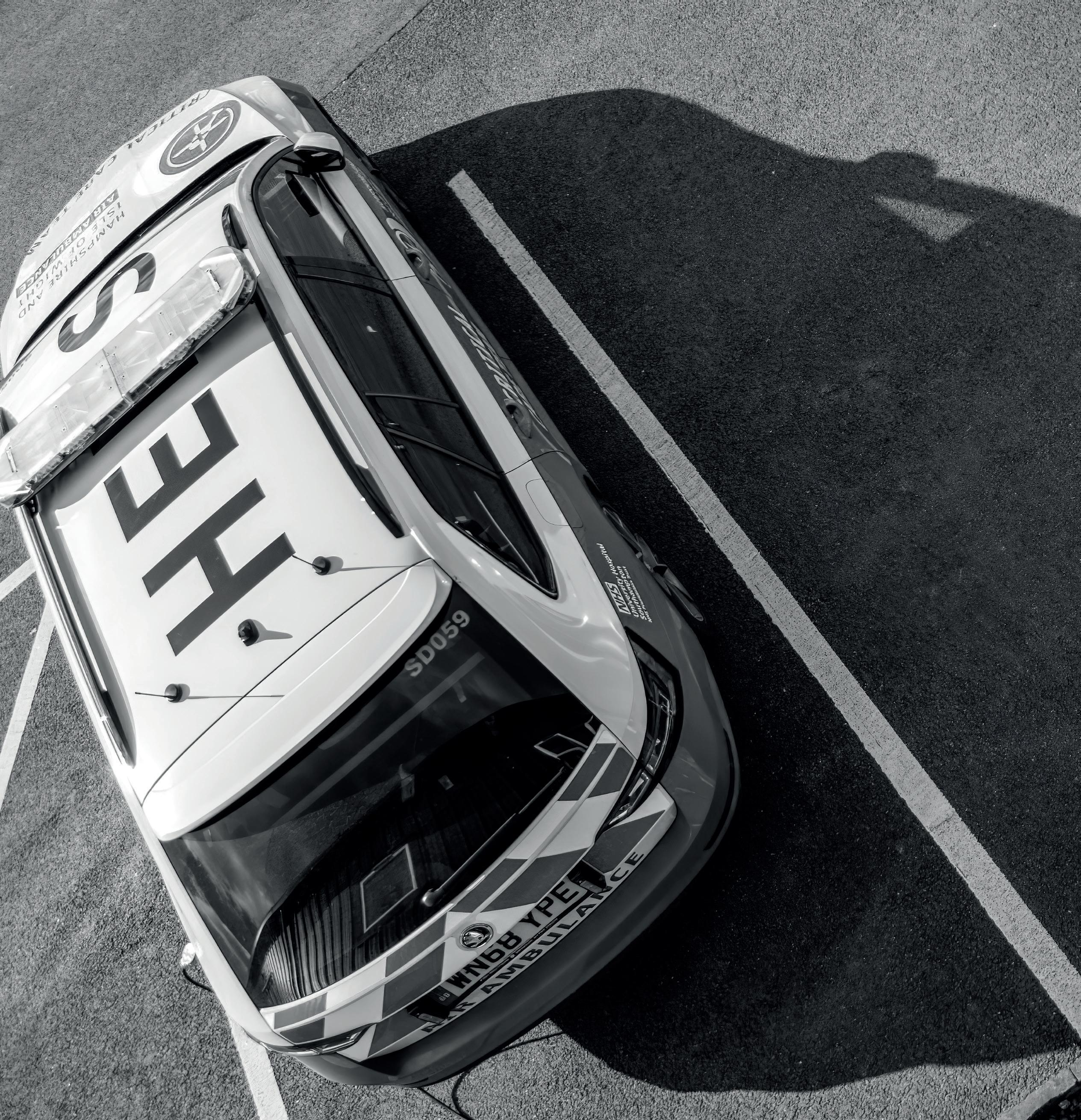Air Ambulance dispatched to 790 call-outs

Emergency Response Vehicles responded to 787 call-outs 99 missions were on the Isle of Wight
ANNUAL REVIEW 2019 - 20
ORDINARY PEOPLE. EXTRAORDINARY CARE. SUPPORTED BY YOU.

Air Ambulance dispatched to 790 call-outs

Emergency Response Vehicles responded to 787 call-outs 99 missions were on the Isle of Wight
ANNUAL REVIEW 2019 - 20
ORDINARY PEOPLE. EXTRAORDINARY CARE. SUPPORTED BY YOU.
Hello and welcome to our Annual Review 2019-2020.
While much of 2019-20 will be remembered for the disruption and devastation caused by the Coronavirus pandemic, for us, the vigor, determination, and collaborative effort to keep your Air Ambulance on the frontline and fully operational will live long in the memory.
Stories of togetherness, creativity and adaptability have, rightly, featured prominently throughout the Covid-19 pandemic. These three topics underpin the theme of our Annual Review and, indeed, echo fittingly our values of: Openness, Dedication, Professionalism and Teamwork.
Thanks to careful planning, prudent financial management and shrewd decision making, we finished 2019 feeling confident in the Charity’s financial position. However, major upheavals to the Charity sector due to Covid-19 has brought about significant changes on how we begin to look forward. This review takes a look back on a year like no other.

Despite various restrictions keeping many of us confined to our homes for much of 2020, our Critical Care Teams responded to 1,577 call-outs. While this represents 685 fewer call-outs on the year before, it still eclipses the figures witnessed for 2018 (1,429). Every member of the team has displayed empathy, innovation and tenacity in their response to the unique demands placed upon them. This attitude was prevalent when our clinicians stepped up to deliver critical care in often challenging and unfamiliar environments.
From hospital Emergency Departments to the belly of a Chinook helicopter with the RAF, our teams have gone above and beyond, truly embodying our Vision: To always bring exceptional pre-hospital critical care to you. Instrumental in getting collaborations with both the RAF and HM Coastguard off the ground, Dr Simon Hughes kindly details the impact of pooling resources and working as a team when providing urgent medical help during the pandemic.
Through a financial year where it has been almost impossible for our teams to venture out into our communities and actively fundraise, your dynamic support has eased the financial burden and enabled us to focus our attentions on what really matters: being there for our patients. Through our regular giving schemes to one off donations, your support in all its forms has been vital.
Sir“QUITE SIMPLY PUT: WE COULD NOT DO WHAT WE DO WITHOUT YOUR SUPPORT.”
“WE SUPPORTED WHOLEHEARTEDLY THE FUNDAMENTAL NEED TO CONTINUE DELIVERING ADVANCED PRE-HOSPITAL CARE TO PATIENTS WHERE AND WHEN THEY NEED US MOST.”
John Day Chairman of Trustees
A key element of our fundraising over the years has been our steadfast relationships with our corporate partners and Trusts and Foundations. Last year, one of those corporate partners, Phoenix Group, displayed unwavering support for our charity when the economic effects of the Coronavirus pandemic took hold, extending their partnership with us for a further 12 months and donating a fabulous total of £50,000. The story of this extra show of support is told by our newly appointed Fundraising Manager, Ray Southam, who has nurtured this partnership from beginning to end.
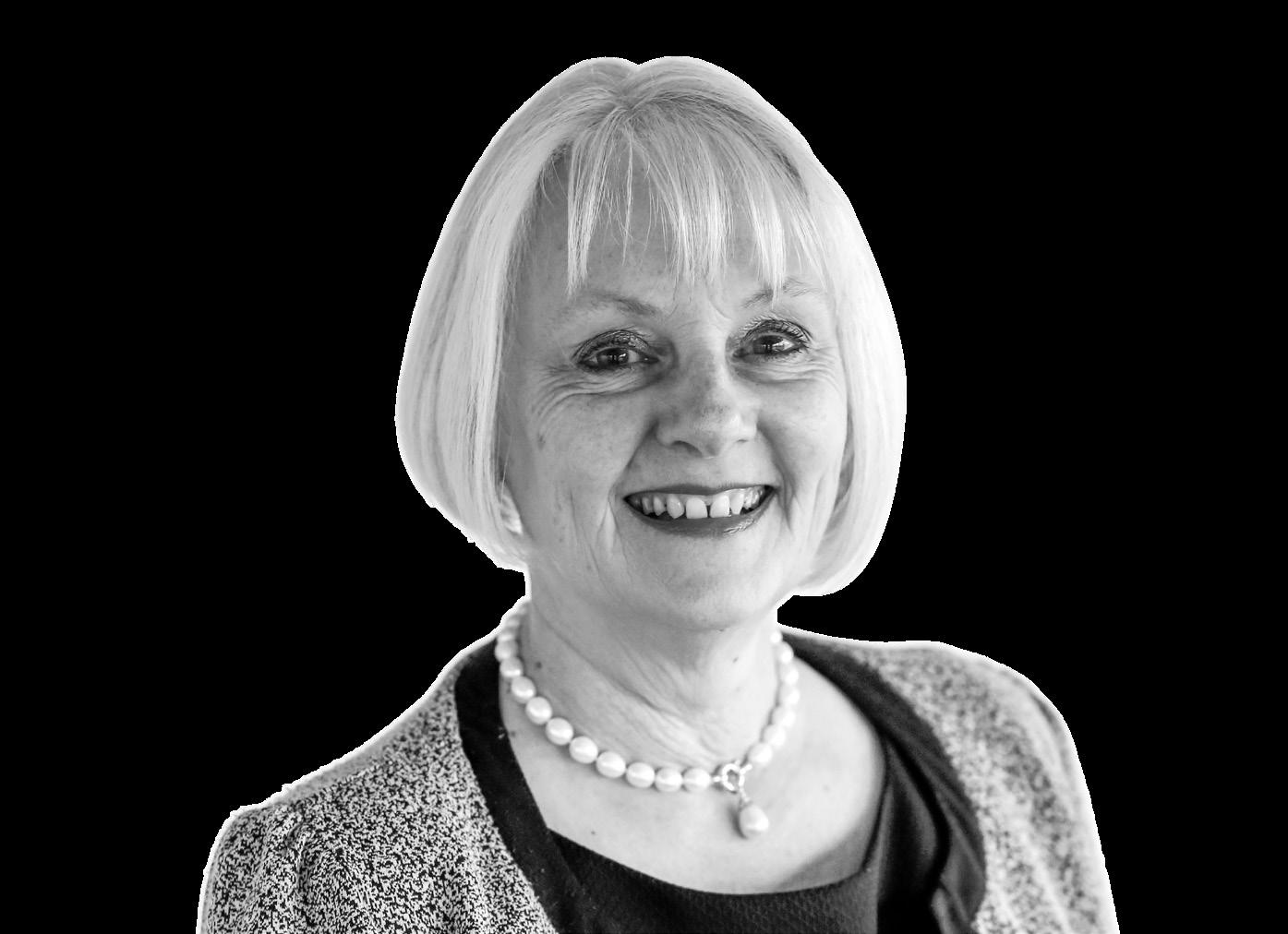
It is only right that we begin our review with a reminder of why we do what we do. In August 2020, Andy was on his motorbike when he crashed into the back of a car that had to apply its brakes suddenly. Andy’s story is a prime example of the importance of pre-hospital critical care; being able to offer advanced treatments - that would normally only be found in a hospital - at the roadside is vital to the positive outcome for so many of our patients.
Another of our patients, Joseph Muir, was in desperate need of critical care when a 1200 kilogram safe crushed him from his shoulder blades down. The very nature of working in prehospital emergency medicine presents the team with unpredictable and unusual incidents every day. As Joseph so rightly says, ‘It’s not every day a tonne and a quarter safe falls on someone’. I want to offer my sincere thanks to both Joseph and Andy for their bravery in sharing the details of the day your Air Ambulance was there for them.
On behalf of the trustees, staff, clinicians and volunteers, we hope you enjoy the stories enclosed in this review, and we want to thank you for continuing to stand by us through these times. Please be in no doubt of the impact your support has on your Air Ambulance charity and our patients.
Sherie Williams Ellen Acting Chief Executive
“YOU HAVE BEEN THERE FOR US THROUGHOUT THIS CHALLENGING TIME AND IF YOU ARE IN DESPERATE NEED OF OUR SPECIALIST SKILLS, WE WILL DO EVERYTHING WE CAN TO BE THERE FOR YOU.”
Last August, Andy headed out on his motorbike on the A272 near West Meon. When a car in front of him suddenly stopped, Andy crashed into the back of the vehicle and was in desperate need of our specialist critical care. Below, Andy tells his story.

I was thinking that before the full lockdown came in, I wanted to head out on my motorbike for one last ride out. I was travelling behind a car along the A272 as I made my way home. I looked in my mirrors, looked back, and the car stopped dead in the road, without warning.
324 road traffic collisions in 2020
21% of all call-outs
I hit my brakes in an emergency stop and flew over the handlebars. The bike followed me, crushing me between it and the back of the car. I remember going over the handlebars, knowing it was going to be bad. I was lying on the ground, struggling for breath and in a lot of pain.
Cars driving past stopped as they saw what had happened. One of them happened to be an off-duty police officer, so he picked up my phone and called for an ambulance. I have no idea how long had past. Time was still. I don’t even remember whether I was going in and out of consciousness, but I do remember that I thought someone was sat on my leg and I was being held down, but it was just because it was so badly broken. My breathing was getting bad now.
I vaguely recall the Air Ambulance landing. The HIOWAA doctor told me they were about to administer some ketamine. Suddenly, all my pain washed away. It was a very psychedelic experience. Almost like a party going on with no music. It felt like a scanner: starting at the top of my body taking effect as it washed over me. It was like a dream. I could hear the sirens and noise, but it was all a blur.
“ONE OF THE HIOWAA CRITICAL CARE TEAM DOCTORS CAME IN THE BACK OF THE AMBULANCE WITH ME, SO I GUESSED THINGS WERE BAD.”HIOWAA - HAMPSHIRE AND ISLE OF WIGHT AIR AMBULANCE
I was trying to figure out the route we were going, but I must have drifted off as the next thing I knew we had arrived at University Hospital Southampton.
I was placed into an induced coma for nine days. I had punctured a lung, broken 11 ribs, damaged my liver and spleen and my heart had taken a bit of a knock. I had suffered damaged to my kidney so bad that it had to be taken out. I woke up in the Intensive Care Unit (ICU) with multiple tubes coming in and out of me.
When he was two weeks into his stay in hospital, Andy was taken for a CT scan to check his progress.
As I was lying in the scanner, I had a cardiac arrest. They did CPR and shocked me twice in an effort to bring me back to life, but I had to spend the next two days in another coma: back to square one. My ribs weren’t brilliant following the CPR, so it just made everything hard work. After a month in ICU, they moved me up to the Trauma and Orthopaedic Ward where I spent a further four weeks.
For eight long weeks I didn’t see my wife. The last time she saw me was when she waved goodbye as I set off on my bike. At the time she didn’t know whether I was going to live or not. Roughly three weeks after the crash I was handed an iPad so we could have a Zoom call. I didn’t have my phone, so my wife would email the hospital and they would print it out, laminate it and show it to me. It was incredible.
After those eight weeks I was discharged home. It was hard, returning home, as I was still quite injured. I had shattered my leg, which I should’ve lost, and, as a result, I’ve got some serious metalwork in there now. I had a bed in the lounge downstairs and used both a wheelchair and a pair of crutches. It was pretty bleak, but it was good to get home.
It still feels like I’ve been beaten up, even now, but my leg is great. Not 100%, but physiotherapy is helping. I can walk up and down the stairs, drive to work, which I returned to at the start of December, and the surgeons are really happy with my progress.
I was looking to retire from the bike. Well, it was in the back of my mind. The crew had to cut all my clothes and leathers off. Everything. The cost implications of replacing the bike, jacket, helmet and gloves, it just felt like the right time to stop and refocus.

I know I’m lucky. But I’ve never been one to dwell on things; I always take things as they come. It must have had an impact on me. There will be times when I take a different approach to things.
I did make some promises to myself in the hospital: spend more time with family; sit in the garden more often and look at the flowers instead of the TV; take the time to go on holiday more, instead of putting my nose to the grindstone; take more trips out that I may have passed up on before. Something like that anyway. It’s always easier said than done.
“THE LAST TIME SHE SAW ME WAS WHEN SHE WAVED GOODBYE AS I SET OFF ON MY BIKE.”
Our patients are at the heart of every decision we make. From fundraising events to medical interventions at the roadside. Due to the varying challenges presented by Covid-19, we have been working tirelessly with multiple organisations, from the Royal Air Force (RAF) and HM Coastguard* through to University Hospital Southampton (UHS) and South Central Ambulance Service (SCAS), to ensure we can continue to be there for the patients who need us most.
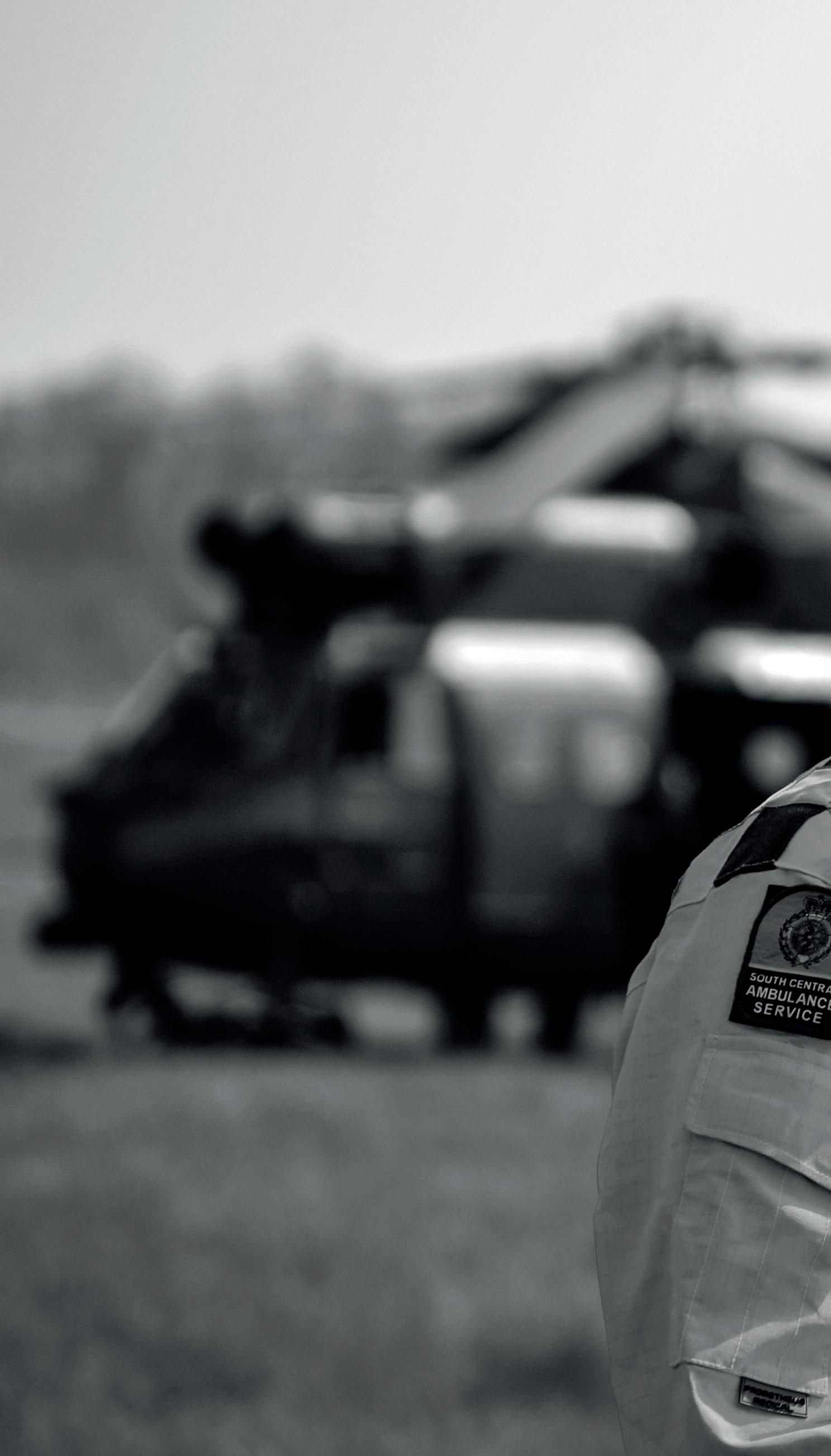
Dr Simon Hughes explains the beginnings and intricacies of these collaborations.
“Throughout the pandemic we have maintained an air and road response, seven days a week, 19 hours a day. From transfusing patients with emergency blood or plasma through to administering complex pain relief for severe fractures. The most high-stakes and the most valuable intervention, however, is anaesthetising a patient who is desperately sick from major trauma or critical illness, and taking over their breathing with a ventilator, looking after their brain, lungs, heart and circulation with extremely powerful drugs and highly capable specialist equipment.”
At the beginning of the pandemic, Covid-19 hugely threatened the normal emergency evacuation processes. In order to help provide some sort of resilience to the Channel Islands and the Isle of Wight, Dr Hughes liaised with the RAF, HM Coastguard and Emergency Planning Officers on the Channel Islands.
“It was a huge amount of work that we went through; I don’t think I slept much in those three days of planning. Working with the RAF and HM Coastguard aircraft allowed us to safely transfer ventilated, Covid-19 positive patients as well as patients with an unknown Covid-19 status. The Chinook, for example, is such a big aircraft that it allows the patient to be at a sufficient distance from the pilot that Covid-19 transmission isn’t an issue. The critical care technologists from UHS, ‘Scotty’ in particular, were incredibly helpful. They’re extremely experienced in interhospital transfers and we worked very closely with them, including borrowing some very specialist equipment.
“To help us prepare we held a large-scale familiarisation exercise at our Airbase in Thruxton, involving HIOWAA’s own doctors and paramedics, the RAF and witnessed by members of the national media, who wanted to feature these innovative collaborations. Approximately 24 hours before the familiarisation exercise, however, we received a call from Jersey who had a time-critical, desperately unwell patient who needed to go to UHS. So before we even had the familiarisation exercise, I was asked if we could help. We had a very short time to gather a specialist team, comprising HIOWAA doctors and paramedics and Scotty from UHS Critical Care.
“In the middle of the night we jumped onboard a Chinook helicopter. The engines were roaring. It was pitch black. The patient was on a tailor-made stretcher on the floor of the helicopter. It’s very different to conveying in a nice, warm and brightly lit ambulance. Ultimately, we’re trying to deliver cutting edge medicine under very challenging circumstances. We can do it, but it’s challenging. It’s a specific skill set that you need. Looking after a critically ill patient in those circumstances means you really need to know what you’re doing and be fundamentally vigilant to any change or deterioration in their condition and anticipate how you’re going to treat that.
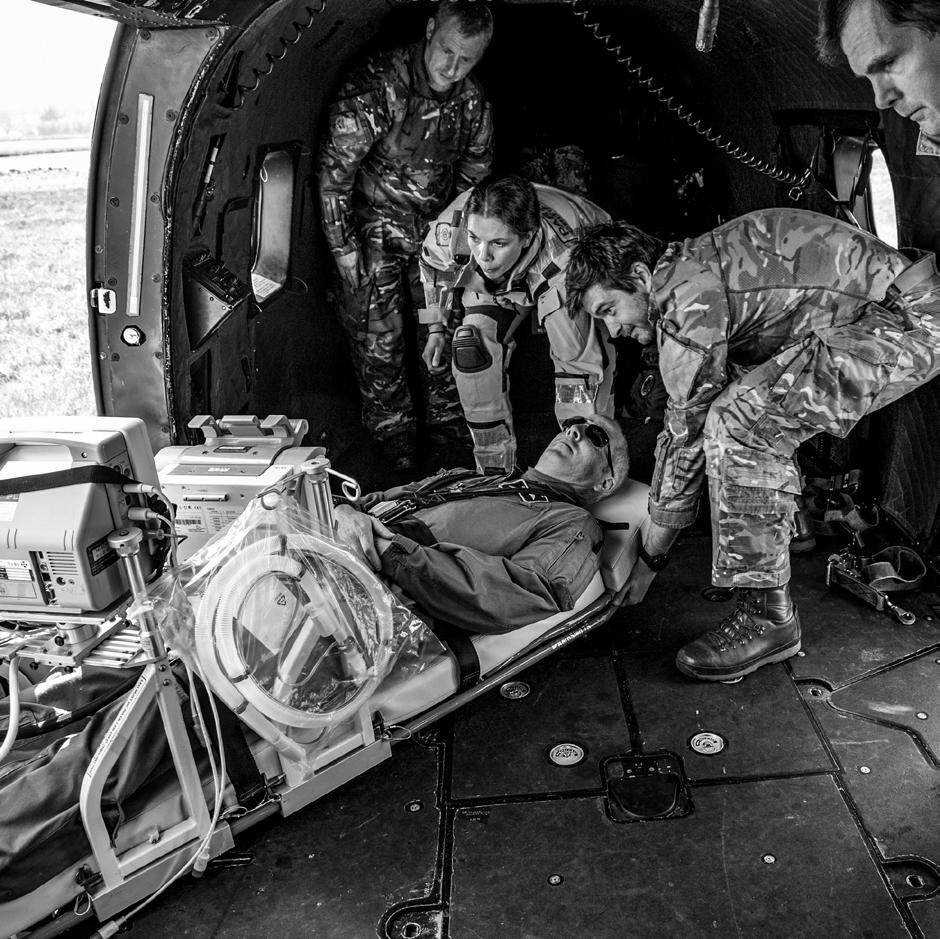
“We also undertook several missions with HM Coastguard. These weren’t just transfers but also urgent Helicopter Emergency Medical Service (HEMS) missions. For example, we’ve flown to the scene in our helicopter, treated the patient and transferred them back to UHS in the Coastguard aircraft.
“The Coastguard helicopter is brightly lit and not quite as noisy as the Chinook, but we’re still dealing with unfamiliar systems. The intercom system doesn’t work that well when you’re wearing full level 3 PPE and it’s an unfamiliar set up to us: we haven’t got our suction just here to the left or the ventilator just here to the right.
“I’m really proud of how we’ve done it. It’s been emotional and exhausting, but this is what we do. We don’t do this job because it’s easy. We do this job because of the challenges. It’s rewarding to face the challenges and succeed as part of a team. Everybody here is highly motivated, highly skilled and wants to do the best for our patients. We want them to survive and to thrive. That’s why we do it.
“There’s been distinct phases of how we’ve felt. Early on there was a huge amount of work lead by Dr Lou Chan, HEMS Specialist Paramedic Oliver Saddler, and the senior clinicians to come up with standard operating procedures as to how we can continue to provide a HEMS service during what was essentially an unknown viral pandemic.
“The key thing has been the team effort. My colleagues at HIOWAA, HM Coastguard, RAF, UHS and SCAS. Everybody has worked tremendously hard.”
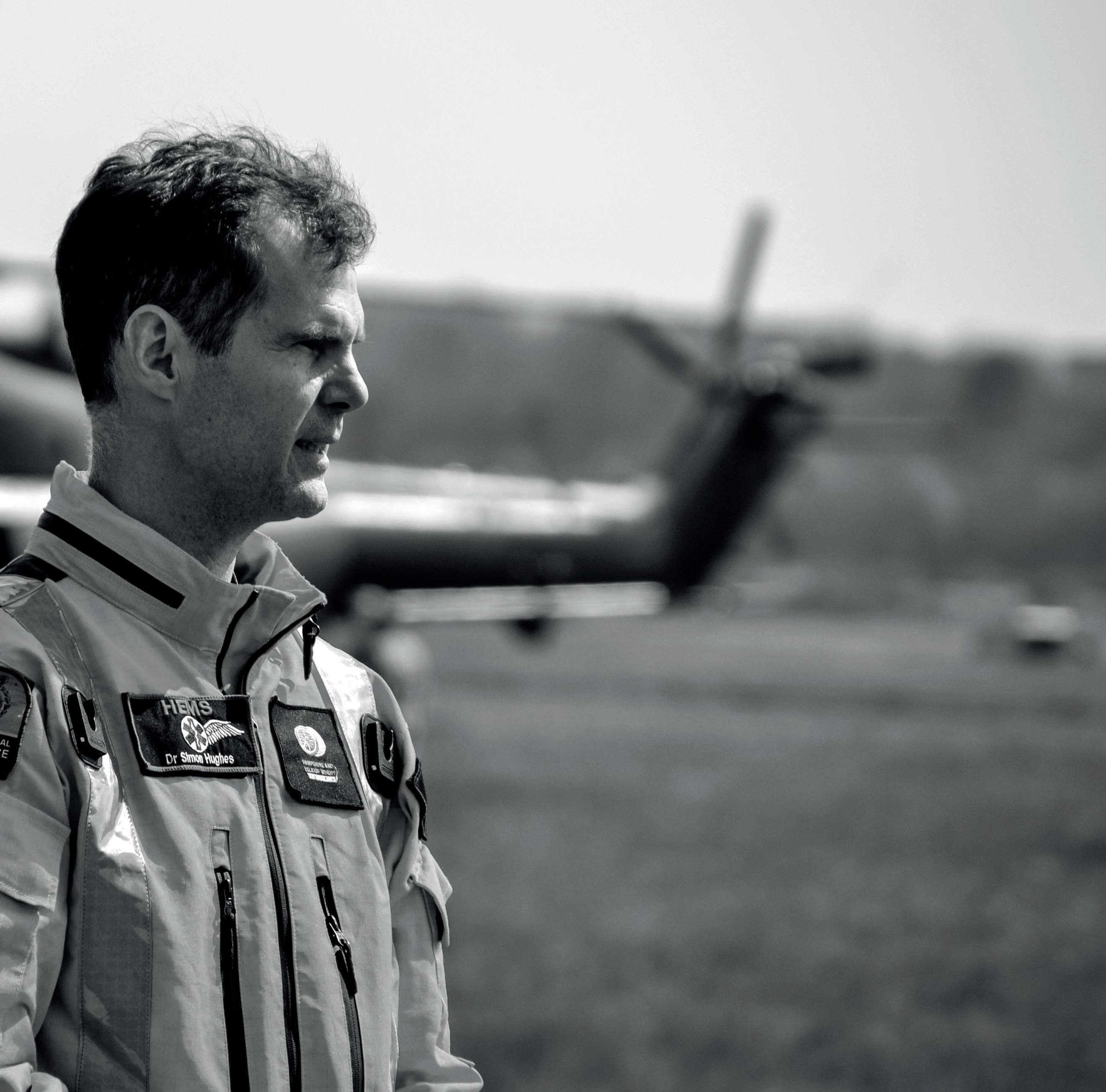
“IN THE MIDDLE OF THE NIGHT WE JUMPED ONBOARD A CHINOOK HELICOPTER. THE ENGINES WERE ROARING. IT WAS PITCH BLACK. THE PATIENT WAS ON A TAILORMADE STRETCHER ON THE FLOOR OF THE HELICOPTER. IT’S VERY DIFFERENT TO CONVEYING IN A NICE, WARM AND BRIGHTLY LIT AMBULANCE.”Dr Simon Hughes
The impact of strong corporate partnerships plays a pivotal role in maintaining our operations as well as providing a platform to organisations that want to make a real difference in the community. With many fundraising opportunities on hold, the importance placed upon our corporate partnerships was amplified. Businesses such as Phoenix Group stepped up and demonstrated the quintessence of what a supportive relationship is through encouragement, understanding and commitment to the Charity. HIOWAA Fundraising Manager, Ray Southam, shares his experience of collaborating with the staff at Phoenix Group, Basingstoke.
How did the relationship come about?
Our relationship with Phoenix Group began in November 2018. The support of HIOWAA was an extension to an already established partnership with three other Air Ambulance charities. When Phoenix Group acquired SunLife, who had a local office in Basingstoke, their corporate social responsibility (CSR) objectives sparked their support of HIOWAA.
Phoenix Group originally started supporting the Air Ambulance community as a result of a personal experience a colleague based in their Head Office in Birmingham had. While I do not know the full details of the incident or its outcome, it’s clear that the work of the Air Ambulance service made a massive impact on everyone related to the incident.
The initial plan was for the partnership to run until early 2020 – this was in line with the culmination of the partnerships with the other Air Ambulance charities. However, because of the financial implications presented by the Covid-19 pandemic, Phoenix Group generously extended their support for a further year.
At a time when the ability to forecast income was challenging to say the least, Phoenix Group went above and beyond by donating £50,000 to each of the four Air Ambulance charities they support. This alleviated a lot of the pressure on fundraising areas where income had stopped: events, community outreach and pot collections. This donation ensured we were able to remain resilient and responsive to the needs of our community at a very difficult time.
Through Phoenix Group’s generous support, we were able to purchase a Lifecast training mannequin for our crew. These mannequins allow the teams to practise and refine certain skills that help give our patients the best chance of survival. All other donations from Phoenix Group have been focussed on operational purposes so that we can remain on the front line, providing the gold standard of pre-hospital care to people in Hampshire and the Isle of Wight.
Ultimately, it’s the alignment of brand values that provide the overall success of any relationship. Phoenix Group’s values of Passion, Responsibility, Growth, Courage and Difference aligned perfectly with our own. This generated a culture of working together to make a positive impact within the community while being innovative, challenging, open and honest.
Additionally, the success of this relationship is down to the individuals driving fundraising activity at a local level. A really strong, positive relationship was formed between both organisations and from this partnership we have developed lifelong support.
The team at Basingstoke were going through a significant change at the time and this partnership offered them a new focus. It was a privilege to see these teams develop over time and be there to nurture them through these periods with fun and inclusive fundraising activities.
Thank you so much for the dedicated support you have displayed over the past couple of years. It’s been a privilege to work with an organisation that holds community at the heart of everything they do – and it also makes the role of a fundraiser that much easier. I know this isn’t the last we will see of each other, and I look forward to the time when we can work together again.

“THE CULTURE AT PHOENIX GROUP HAS SHOWN THAT WHEN TEAMWORK IS PLACED AT THE HEART OF EVERY DECISION, ANYTHING IS POSSIBLE.”
At the beginning of October, one of Joseph’s businesses had sustained a break in, with roughly £25,000 worth of equipment being stolen. After replenishing the stolen tools, he knew they had to up their security. On Tuesday 3 November, as Joseph and his team took delivery of an industrial safe, disaster struck when the safe slipped off the pallet and headed straight for Joseph. The HIOWAA Critical Care Team were called instantly. Below, Joseph tells his remarkable story.
787 missions in our
When the safe toppled over I knew I had no chance of getting out of the way. In that split second, I pushed myself back off the safe and spun myself around, to avoid causing injury to my neck. My head had gone into survival mode. I felt exhausted. As though every little bit of breath I had in my body had escaped, like a whoopee cushion that had been sat on. I could barely breathe, just enough to stay alive. As they pulled me out to my knees, I felt my left ankle click. ‘Well, at least I’m out’, I thought. I was conscious but knew I had some serious injuries. My back began to spasm. It felt like I was being electrocuted. I rolled onto my front and curled up into the foetal position, which is where I stayed until the emergency services started arriving.
“THE SAFE, STANDING 6-FEET-HIGH AND 3-FEET-WIDE, WEIGHING AROUND 1250 KILOGRAMS - THREE TIMES AS HEAVY AS A GRAND PIANO - MANOEUVRED OFF ITS PATH, SQUASHING ME UNDERNEATH IT. THE SAFE MISSED MY NECK BUT HIT ME BETWEEN THE SHOULDER BLADES, CRUSHING ME INTO THE MUD.”
I remember hearing cars driving up and down the main road and thinking, ‘You’ve got a seven-year-old son at home, why are you here?’. He could have easily ended up without a dad. When the first responder arrived, they examined me and gave me lots of different possibilities. He told me that the paramedics weren’t far behind and said, ‘Because of the extent of your injuries, the Air Ambulance has been called’. I struggled to properly absorb anything I was being told. Then, they lost me for a minute. I can only describe it as my ears started ringing and my head went black. Like I was stood in a cold, dark tunnel. The paramedic gave me a harsh slap across the face: ‘You left us for a minute’, he said.
The HIOWAA Critical Care Team arrived and got to work fast. It’s not every day a tonne and a quarter safe lands on someone, but they knew exactly what to do. My temperature had gone down to 32 degrees, which was dangerously low. They got me on the backboard and told me I was freezing cold: ‘We need to get you on to the stretcher and into the ambulance to get you warmed up.’

They got me into the ambulance and cut my clothes off. ‘We could try to roll you side to side but we don’t want to disturb your body, which may cause further damage. The best thing to do is get you in the ambulance and get some blood in you, as you’re bleeding internally’, they told me. He asked my blood group and, like most people, ‘I have absolutely no idea’ was the reply. The original plan was to take me in the ambulance to the helicopter and transfer me to University Hospital Southampton (UHS). But the HIOWAA doctor said the best bet was to drive me to UHS. ‘I’ll stay with the patient and keep him stable, let’s get him to hospital.’ And off we went.
When I arrived at UHS I was admitted to the Resuscitation area and was given another litre of blood. I lost three litres in total. I had broken my pelvis in two places, ruptured my spleen, ruptured my left kidney and broken three vertebrae in my lumbar spine. I was taken for an operation on my pelvis the following afternoon. They told my wife I should be in surgery for roughly three hours. Seven and a half hours later, the surgery was complete. After that operation I sustained chronic pneumonia and a pneumothorax: a collapsed lung.
I was one of four patients within the non-Covid-19 side. Every 24 hours we had a Covid-19 test. It was manic. But they were very good at caring for us. I was bedbound in the Intensive Care Unit for approximately six days before I was transferred up to the Trauma and Orthopaedic Ward, where I remained bedbound for a further three days. While there were still no visits possible, they arranged for a Skype call with my family every day. My wife saw me with lots of tubes attached when I was first admitted into the Emergency Department, but I certainly wouldn’t have wanted my son to see me like that. On the Tuesday afternoon the doctor who saw me upon arrival discharged me and released me home. They thought I’d be in hospital for roughly six to nine months, not 15 days. My wife and I decided not to tell my son I was coming home. Patient Transport Services picked me up and dropped me off just before he got back from school, and he came home to me sat in the living room. He was ecstatic; it was like Christmas Day. We’ve had a lot of mixed emotions.
Mentally, it’s probably affected me and opened my eyes to reality. I often think, ‘I could have died’. It’s probably knocked me a little bit. I’m quite a strong-willed man, but it has made me have a second glance at things. I’m 41 years of age now. You’d think I would have had a reality check much younger than this. I understand that I’m very lucky. I don’t think there’s many people who could be crushed by something so heavy and live to tell the tale. There must have been someone looking after me that day.

But it all comes down to the specialists who took care of me. I’m extremely grateful that the Air Ambulance arrived that day.
I must thank everyone who helped me. HIOWAA, the NHS, South Central Ambulance Service and every single doctor and nurse who treated me: thank you. Without them, I just would not have survived it.
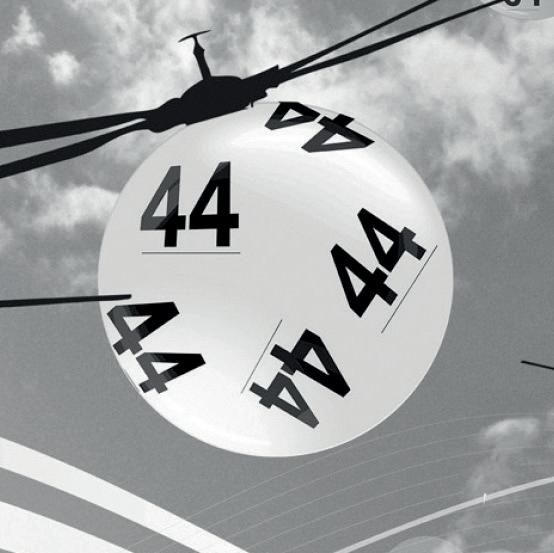
Our partners at Lottery Fundraising Services (LFS) operate our lottery scheme, Flight for Life Lottery. For just £1 a week, supporters can win up to £500 in the knowledge they are helping to save countless lives in Hampshire and the Isle of Wight.
£4m raised by 61,698 lottery players in 2019-20
£45m has been raised through our Flight for Life Lottery since the first draw in 2005.
‘Regular gifts have allowed us to plan for the future because we know, day in day out, that we will have a steady income stream that we can rely on. This year, the donations we received through our Small Change Big Difference Campaign and our Flight for Life Lottery gave us the stable income we needed throughout the pandemic. A very large volume of smaller but impactful donations have ensured the future of your Air Ambulance.’
HIOWAA Director of Fundraising, Rachel LeamanIn October 2017, we launched our regular giving scheme, Small Change Big Difference: a campaign designed to provide a steady income to help secure the long-term future of the Charity. We called on supporters to make a monthly donation of £8, equating to 26p a day, or just over 1p an hour.
£967k donated by 10,580 SCDB supporters 2019-20
£1.6m has been raised through Small

since 2017.
Our canvassers are employed by LFS and help spread the word of the Charity and promote both Flight for Life Lottery and Small Change Big Difference. They are trained to the highest standard, wear charity uniform and always carry ID. They are also regulated by the gambling commission and are legally compliant.
After the success of our night-time fun run, Dash in the Dark 2019, we couldn’t wait to bring everyone together to do it again in 2020. Sadly, due to the Coronavirus pandemic, we knew early on that getting our fantastic supporters in the same place wasn’t going to be possible. Therefore, we decided to run our first ever virtual event, to allow our supporters to get out and champion their local Air Ambulance, at their pace and place. HIOWAA Fundraiser, Oscar Marshall, explains the process of organising the Charity’s first ever virtual event.

213 supporters raised a total of £5,800
Firstly, we needed to select a date for our modernised Virtual Dash in the Dark to take place. To make the event as inclusive as possible, we decided to give participants a week in which to complete their Dash, and what better week than National Air Ambulance Week, 7 - 13 of September.
Inclusivity and togetherness were themes we really wanted to achieve, in a time when our supporters may understandably have felt distant. Therefore, we encouraged anyone taking part to purchase their very own Dash in the Dark T-shirt, so that they could share photographs of themselves all dressed up.
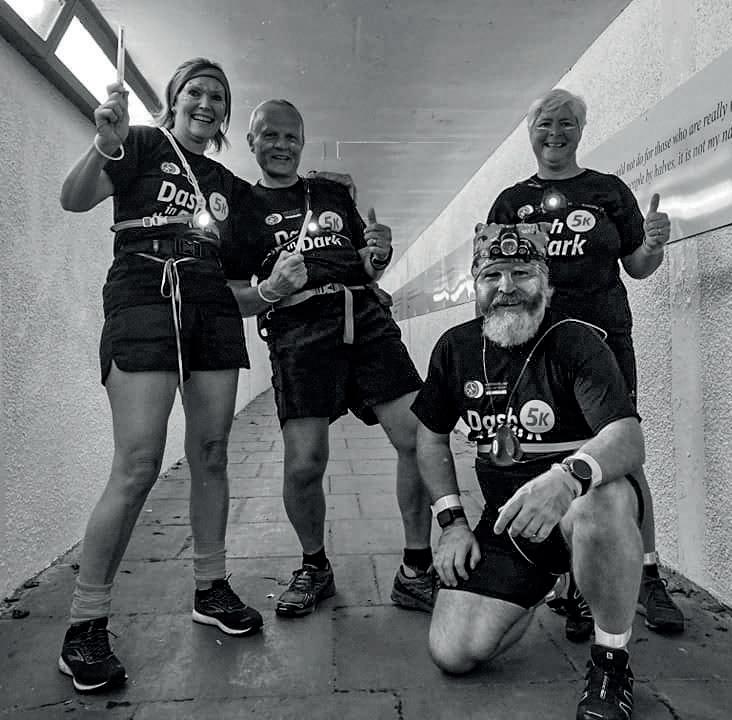
Our communications team set to work to ensure we had a bespoke event sign-up webpage on our website, while promoting the event through our various media streams. Once the page went live, we saw a steady stream of supporters buying tickets, t-shirts, and water bottles. This required a weekly process of posting out the Charity merchandise and carefully monitoring our stock. We also saw some of our ‘Dashers’ choose to set up fundraising pages, collecting sponsorship for their 5k. Communications were made via email to these participants to offer any fundraising guidance.
We asked everyone who got involved to send us their finisher’s photos so that we could post out their bespoke, glow-in-the-dark medals with their certificates. These came in the form of either a screenshot from an activity recording application, or pictures while out completing the challenge.
Virtual Dash in the Dark was a wonderful success, with 213 supporters raised a total of £5,800.
To continue providing our truly gold standard of pre-hospital emergency care, our Critical Care Teams of doctors and paramedics complete rigorous courses, training programmes and emergency simulations each year. Michael Bradfield, who recently joined the team as our HEMS Paramedic Clinical Lead, describes the ways in which the teams have had to adapt:
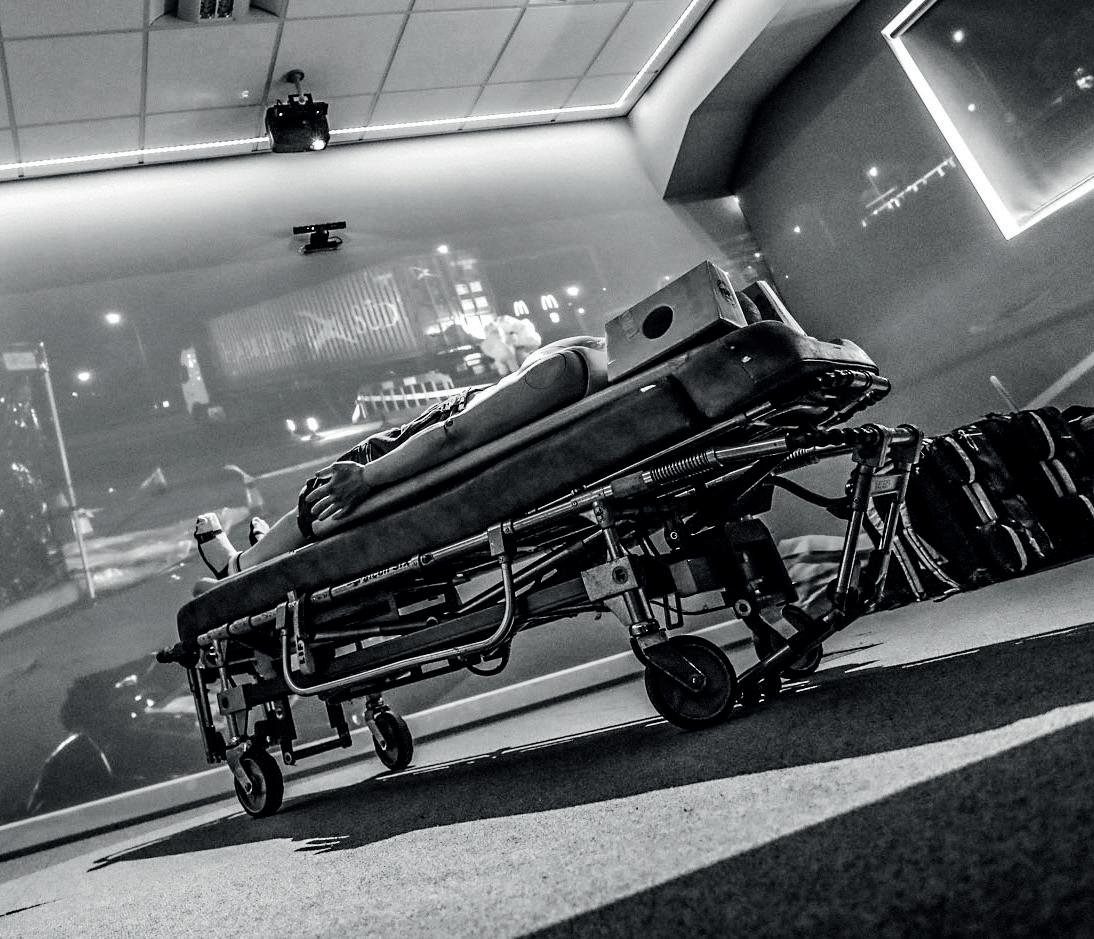
‘In common with all pre-hospital care services, Covid-19 has presented some significant challenges to how we operate and how we continue to work and train together. It has been necessary to adapt our ways of working to ensure that we continue to maintain our standards of care. We attend to some of the most severely ill or injured patients in Hampshire and the Isle of Wight, and we need to be at our best when we meet them. As a team we would usually meet together regularly to undertake face-toface training sessions, attend external courses and events and undertake simulation to ensure that we maintain competency and currency. Although current restrictions mean that we are not able to do so in the same way, we have used technology to continue to deliver our clinical team education and governance days, and have continued to audit and discuss clinical cases, have external speakers and receive valuable training via Microsoft Teams.’
Below are some of the courses and qualifications passed by the team between October 2019 - Sept 20. These achievements were celebrated at our inaugural Crew Celebration Evening in November 2019.
• HEMS Specialist Paramedic Louise Wigmore
• HEMS Specialist Paramedic John Gamblin
• HEMS Specialist Paramedic Mike Funge
• HEMS Paramedic Julian Hannah
• HEMS Paramedic Dave Zaple
• HEMS Paramedic Lucy Cameron
• HEMS Paramedic Nigel Harley
• HEMS Paramedic Sophia Rosario

• Consultant Paramedic Els Freshwater
• Dr Lee Barnicott
• HEMS Specialist Paramedic John Gamblin
• Consultant Paramedic Els Freshwater
Phase 1a of PHEM training scheme
• Dr Jamie Plumb
• Adam Palmer and Brian Hanley
“IF WE ASPIRE TO DELIVER THE HIGHEST POSSIBLE STANDARDS OF CARE, IT IS VITAL THAT WE MAINTAIN OUR REVIEW AND DEBRIEF OF CASES, SHARE OUR LEARNING ACROSS THE TEAM AND CONTINUE TO MAINTAIN OUR SKILLS AND SIMULATION TRAINING.”
The website of a charity or organisation is often the first thing people wanting more information about a service will seek out. As well as a central place with key information and contact details, a website is a tool to build brand awareness, highlight impact with strong imagery and graphics, and have a clear call to action.
In March 2020, we freshened up the look and feel of our website and added some new key features. Following an internal audit, key areas were highlighted in order to improve the user experience for our supporters, create a stronger, more prominent call to action, and to try and make savings and drive donations to the Charity.

£65,582.60 processed in website transactions
A new attraction to the homepage gives supporters the opportunity to see our crew in action, with video footage of the team and how they respond by air and road.
The video has a prominent call to action for supporters to donate. This process has been made easier for supporters to choose to make either a one-off or monthly donation, which can be done in less than two minutes.
Making an upfront call to action has had a dramatic impact on online donations and transactions. Between March 2020 and September 2020, the website handled £65,582.60, compared to £31,183.30 in the same time the previous year. This is an increase of £34,183.30 (108%) coming through the website alone. In a time when we were unable to fundraise through events, canvassing and community outreach programmes, this extra income has been vital to our service.
Approximately 50% of our audience visit our website on their mobile phone. This led us to placing a much bigger focus on improving how the website is viewed via mobile devices. A donate button that stays present at the top of the page as the reader scrolls was developed. This allows them to easily access the donate page at any time and reminds them of the importance of their donation.
To process ticket sales for events, charities and organisations will often turn to third party platforms such as Eventbrite. To move away from websites which charge for their services, alongside our partners at Wildcat, we created a bespoke event registration tool which allows us to process ticket and merchandise sales for events as well as look after participants’ data ourselves.
Thanks to the fantastic team at Wildcat Creative for creating the fresh design.
“Wildcat is delighted to continue to work with HIOWAA to develop and improve supporters’ online experience, grow engagement and facilitate increased donations through a channel which – due to unique recent circumstances – has become ever more important. HIOWAA’s vision for the website’s direction and approach to partnership working makes the delivery of often challenging projects a pleasure. We are incredibly proud to count such a well-regarded and loved local heroes as one of our clients.”
Our value of Teamwork underpins everything we do as a service. From our crew on the front line to our communities of dedicated supporters. This value also extends to the support of one another within the Charity’s various teams.
Affectionately known as ‘ChOps’ and led by HIOWAA Acting Chief Executive, Sherie Williams Ellen, the Charity Operations Team is made up by the Data, Volunteering and Business Support Teams; Marketing & Communications, Equipment and Airbase Support.
2019 had been seen out in good spirits with staff and Volunteers coming together to celebrate the annual Christmas ‘Get Together’. The New Year started as any other: planning for events, recruitment, training and our highly regarded Volunteers’ Annual Conference.
Due to the rapid advance of Covid-19, all this was about to change. In February, we set about cancelling upcoming talks and events; pot collections and van runs were suspended, along with all other Volunteer activity and community outreach from 13th March. As the nation went into lockdown, and Charity staff began working remotely, the decision was made to close our online shop.
With many of the Charity team now on furlough leave, we needed to adapt to a new way of supporting each other. Regular wellbeing calls, weekly quizzes and online afternoon teas quickly became a normal part of the working day. A small team continued to attend the office on a strictly limited rota, to receive incoming mail, ensure that thank you letters were sent and to ‘bridge the gap’ for colleagues who were working from home.
And while HIOWAA adapted, so did its supporters. In May, thanks to several hugely successful digital campaigns, it became evident that online giving and communications were on the rise and it was soon necessary to bring Administrator, Vikki Charlesworth, back from furlough leave to assist our new Data Team Leader, Emma Rowe, in processing online donations and updating our database.
Meanwhile, Volunteering Administrator, Leanne Cox, assisted the Business Support Team to focus on customer service and to manage the bustling enquiries email address. Administrator, Karen Barter, continued to process a steady flow of cheque donations and Administration Manager, Kate Pritchard, together with Airbase Support Officer, Chris Tate, worked to prepare the office for their colleagues’ anticipated return.
The introduction of work ‘bubbles’ allowed more staff to spend an occasional day back in the office. Best of all, good weather meant that regular outside meetings could take place and we could reconnect with some of our administrative Volunteers.
Also now returned from furlough leave, Equipment Officer, Rolf Kitching and Volunteering Team Leader, Kirsty Davies, began to prepare for the safe return of our Volunteer Drivers and Cash Counters. Screens, PPE and cleaning protocols meant that the Charity could be visible in our communities once again. Isle of Wight Volunteer, Dave Ford, had also re-started his rounds, collecting 53 pots from 44 locations.
Morale was high as we ended this strangest of years; the team’s perseverance, determination and flexibility had ensured the Charity’s high standards were maintained, sometimes improved, despite all the restrictions.
“NONE OF WHAT WE DO IS POSSIBLE AS INDIVIDUALS. WE SUPPORT OUR COMMUNITY AND OUR PARTNERS, AND THEY SUPPORT US.”
The Hampshire and Isle of Wight Air Ambulance volunteer calendar is, ordinarily, full of events, talks, presentations, cash collections and opportunities for office support roles. However, when lockdown restrictions struck in March 2020, these activities were either cancelled or postponed.
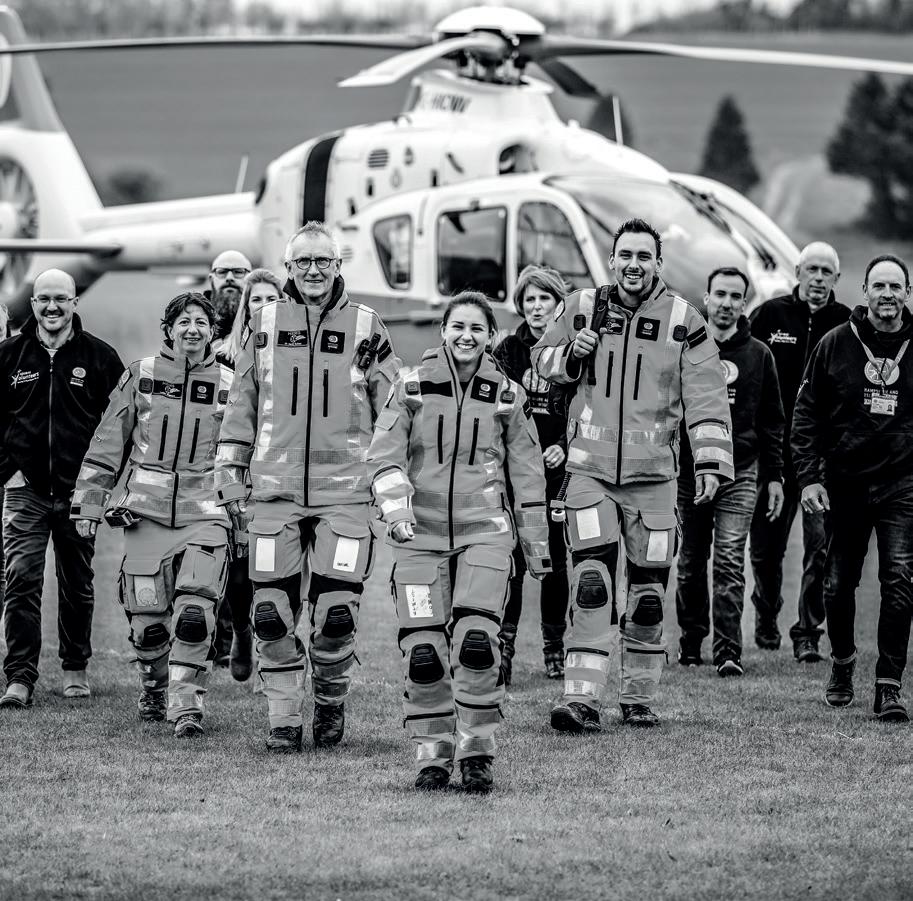
‘Ensuring our volunteers were safe and reminding them how important they are to the Charity was of paramount importance to the team and me. So we did what we could to support them remotely. Many of our volunteers offered their time to other community-based calls to action: setting up newspaper delivery systems, baking for neighbours, delivering prescriptions and volunteering at local doctors’ surgeries.’
Kirsty Davies Volunteer Team LeaderSue is one of HIOWAA’s office volunteers, she said: ‘Being a volunteer for Hampshire and Isle of Wight Air Ambulance has been an enjoyable and rewarding part of my life. Suddenly, in March, all that changed. No more events or helping in the office. ‘What happens now?’ I thought. Well, Kirsty and the rest of the team came to the rescue with plans to keep in touch via weekly ‘Virtual Coffee and Catch-Up’ sessions and regular emails with updates on the Charity. There have also been regular newsletters and opportunities to participate in webinars. So, although we as volunteers have been unable to physically help out at HIOWAA, we are still made to feel part of the team.
I have not been able to participate in the Virtual Coffee and Catch-up sessions recently as they occur on one of my actual ‘working’ days. I am semi-retired and have been working two days a week for the NHS. This has given me some sense of stability and the chance to meet people during these difficult times. There have been many challenges, but I feel lucky to have been able to keep working. But we have all risen to the challenge of those changes. Be it at UHS, HIOWAA or in everyday life.
I would like to think that, throughout the pandemic, I have helped to keep a small part of UHS going, by providing a service during these difficult times. And every time I see or hear the Air Ambulance on its way to or from the hospital, I am proud to think that I volunteer for such a great charity.‘
“ONCE AGAIN, OUR AMAZING TEAM OF VOLUNTEERS SHOWED THE WORLD JUST HOW INCREDIBLE THEY ARE.”HIOWAA - HAMPSHIRE AND ISLE OF WIGHT AIR AMBULANCE
175 volunteers supporting the Charity
The total income for HIOWAA during the financial year ending September 30th 2020 was £7,514,829. 58% of our income came from our lottery and at the end of September 2020 we had 61,753 supporters paying £1 every week to play our lottery, helping us to raise over £4 million over the financial year. We raised £2,587,099 thanks to the regular donations received from individuals and from legacies. It is only thanks to your ongoing support that we are able to keep the Air Ambulance flying and saving lives.
Figures based on Statutory accounts at 30.09.2020
The total expenditure for HIOWAA during the financial year ending September 30th 2020 was £7,763,706. 57% was spent on day-to-day operations of the Air Ambulance, 30% was spent on fundraising and lottery costs. It is important that we invest in fundraising and our lottery to generate the income that we need to secure our long-term future. For every £1 that we spend on fundraising and lottery costs, we generate £3 in income. 12% was spent on support costs and governance.
The statement of financial activities incorporating the income and expenditure account includes all gains and losses recognised in the year.
All amounts relate to continuing activities.
Approved by the Trustees and authorised for issue on and signed on their behalf by:
Sir John Day Chairman Peter Taylor JP FCA FRSA TreasurerAnalysis of changes in net debt would replicate the information provided above and is therefore not disclosed.

Our corporate partners make a valuable contribution to our funding and help ensure we are there for you when you need us most.
Albright International
Angela Holidays
Beaulieu Enterprises
BP Garages
Bryan Cave Leighton Paisner
LLP
Burbidge’s Bakery
Charisma Charity
Recruitment
Costco
DAT
Day Lewis Pharmacies
DSTL Porton Down
Embedded IT Ltd
ExxonMobil
Foresters Friendly Society
Garthowen Garden Centre
Hall and Woodhouse
Healthcare Computing
HSBC
The Breeze Restaurant,
Isle of Wight
Island Infinity Clothing
Lara’s Recycling Waste
Marks and Spencer
Marriott Hotel
Maxwell Dando Ltd
Moore (South) Chartered
Accountants and Business
Advisers
MRH Retail
NATS, Swanwick
NatWest
The support that we receive from Charitable Trusts and Foundations allows us to continue saving lives across our region. During a time when many of our regular fundraising activities and community outreach programmes were put on hold, many charitable Trusts and Foundations stepped up to support us in our hour of need.
Neilcott Construction Ltd
Ntegra Limited
Oakwoods
Omnimed Ltd
Open GI
Phoenix Group
R&W Civil Engineering
Response Systems Ltd
Red Mist Leisure Ltd
Roma Publications Ltd
Serco Group plc
Southampton Airport
Southern Driving Instructor Association
strukta Group Ltd
Tailor Made Kitchens Ltd
Tonic Analytics
TSB
Vines Group
Vitacress
Waitrose
Wessex Lift Co. Ltd.
Wightlink
Wilkins Kennedy
WP Recruitment & HR Ltd
A.W. Gale Charitable Trust
Adrian Swire Charitable Trust
Bayfield Charitable Trust
Cooke Family Trust
Daisie Rich Trust
Frank Russon Charitable Trust
Gess Charitable Trust
Hendy Foundation
In-Excess Charity Trust
John Swire 1989 Charitable Trust
Kinsbourne Trust
Loseley Christian Trust
Malcolm Isaac Charitable Trust
Manydown Charitable Trust
Maurits Mulder Canter Charity
R E Pilkingtons No 4 Settlement Charitable Trust
Stella Symons Charitable Trust
Stephenson James Charitable Trust
The Albert Hunt Trust
The Bassil Shipham and Alsford Trust
The Beaulieu Beaufort Foundation
The Beechgrove Trust
The Broad Cairn Foundation
The Burry Charitable Trust
The Dennis Byrne Charitable Trust
The Dixie Rose Findlay Trust
The F.J Wallis Charitable Settlement
The George Cadbury Trust
The Gerald Micklem Charitable Trust
The James Wise Charitable Trust
The Iliffe Family Charitable Trust
The IMP Trust
The Joan Ainslie Charitable Trust
The Mackintosh Foundation
The Park Family Trust
The Paul Coleman Trust
The Polo Charity Trust
The Richard Kirkman Trust
The Rockley Charitable Trust
The Rotherwick Foundation
The Rothes Charitable Trust
The Shanly Foundation
The Sir Jeremiah Colman Gift Trust
The Wyndham Charitable Trust
Masonic Lodges
Caer Gwent Lodge No 5071
Carnarvon Lodge 804
Clanfield Lodge
Fareham Masonic Lodge
Fernhill Lodge
Georgian Lodge
Hamtun Lodge 7083
Havant Masonic Lodge 4689
Horndean Lodge of Harmony
Lodge of Hope
Meon Valley Masonic Lodge
Osborne Lodge No 2169
Oswald Lodge
Sarnia - Riduna Lodge 5840
The Provincial Grand Lodge of Masons Hampshire & Isle of Wight
The Vectensian Lodge No. 7852
Neighbourly Community Fund
We sent At the end of September 2019 we had:
68 email campaigns via our email marketing platform
September 2019
7,520
September 2020
9,414
An increase of 1,894 (25%)
22,660 Facebook followers
11,316 Twitter followers
2,687 Instagram followers
58 LinkedIn followers
At the end of September 2020 we had:
22,660 Facebook followers
An increase of 8%
12,280 Twitter followers
An increase of 9%
3,882 Instagram followers
An increase of 45%
664 LinkedIn followers
An increase of 1,045%
7,002 YouTube views
168 hours of watch time
411 Tik Tok followers with 35,508 views
Virtual Facebook ‘Quiz with the Crew’: viewed for a combined total of
75,893 minutes or
53 days
On
